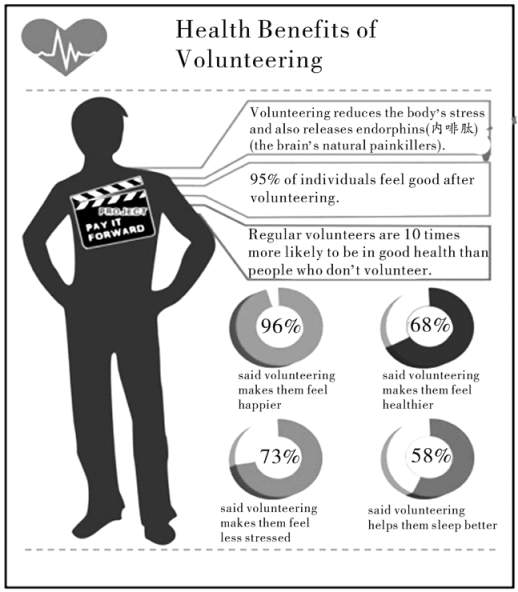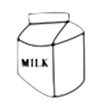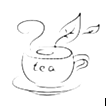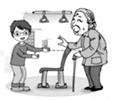—He is ________ the cake into five parts so that each of the family members can get one.
—It ________ belong to Linda. She was looking for hers just now.
—Yes. Thanks for reminding me. I almost forgot it.
—Yes. We can't be too ________ when crossing the road.
—It is based on knowledge and leads people to discover the secrets and cultural meanings behind geographical names.
—We should be independent and learn to ________ ourselves well.
—Only 5 minutes' walk.
 Quoc Thyungen is a 40-year-old Vietnamese Canadian. His story really inspires(鼓舞)me. He came to Canada with 1 family when he was just a threeyearold boy. There was a 2 in his country, and his parents wanted to move to a place where they could raise their children in peace and safety. His life was just like other boys' lives. He went to school, and did well in university. When he graduated, he 3 a restaurant. But something was missing in his life.
Quoc Thyungen is a 40-year-old Vietnamese Canadian. His story really inspires(鼓舞)me. He came to Canada with 1 family when he was just a threeyearold boy. There was a 2 in his country, and his parents wanted to move to a place where they could raise their children in peace and safety. His life was just like other boys' lives. He went to school, and did well in university. When he graduated, he 3 a restaurant. But something was missing in his life.
One summer, he went on a trip to Vietnam(越南). When he arrived in Hanoi, he saw many 4 boys living on the streets. As he talked with them, he 5 how much he had been given in his life. He felt a 6 need to do something meaningful. He knew that a handout would not 7 change their lives. He thought of himself and those who had helped him.
Then he 8 a small house in downtown Hanoi. It served Vietnamese and Westernstyle food. He taught some of the boys to cook, others to work with the cash, and the others to wait on tables. So far, more than 75 kids have learned a 9. Seeing them, he felt happier than ever before. Thanks to Quoc, they earned their own money and no longer had to beg for it 10 strangers.
Quoc says that helping these kids has helped him find what was missing in his life.
Mother's Day was coming. Anna really wanted to get her mom something special. In the first grade, Anna made a card for her mom. In the second grade, she wrote her a poem. But now she was in the third grade. Anna thought her mom would want a real gift from a store.
Anna went to a store near her house. That was where she could get her mom's gift. She saw a beautiful hat, but it was 15 dollars. She wanted to buy a scarf for her mom, but the scarf was even more expensive—18 dollars! Anna looked around the store but nothing was available(可得到的) for her. She bought nothing because nothing that she wanted was less than 12 dollars.
Anna walked home sadly. She got an idea. She took out some paper and a pencil, and made some cards. On each card, she wrote a thing that she would do for her mom. On one card she wrote,"I will help you make dinner." On another one she wrote, "I will clean the house and do laundry(洗衣服)." She wrote eight more and put the cards under her bed. She didn't want her mom to see them before the special day.
On Mother's Day, Anna gave her mom the cards. Her mom thought the gift was great. In fact, she thought it was the best gift ever!
The main goal of volunteering is to help others. But it turns out volunteers also benefit(对……有益)from their activities. Allan Luks is one of the leaders of research on the health benefits of kindness. He led the first research which connected the emotion(情感) with physical health benefits achieved by those who regularly help others. The study that Allan Luks conducted of 3,000 volunteers has proven volunteering is good for both the body and mental health. 
Dehydration(脱水) is a trouble on human performance. It can cause tiredness and weaken the attention among athletes, according to a 2018 study in the journal Frontiers in Physiology. Even mild(轻微的) dehydration can affect a person's mood or ability to concentrate.
Water is cheap and healthy. And drinking water is an effective way for most people to stay hydrated. The National Academy of Medicine suggests that adult women and men drink at least 91 and 125 ounces(盎司) of water a day. But lots of water in the morning, at noon and night may not be the best or most efficient way to meet the body's hydration requirements.
Drinking water before or during a meal or snack is a good way to hydrate. "Drinking water with amino acids(氨基酸) or fats or vitamins or minerals(矿物质), such as milk or juice helps the body take in more of the water." David Nieman says, a professor of public health at Appalachian State University and director of the Human Performance Lab at the North Carolina Research Campus. Some of his own research has found that eating a banana is better than drinking sports drinks when it comes to postexercise recovery.
For those who are hoping to stay perfect hydrated, drinking slowly and mixing water with a little food is a more effective method than quickly drinking full glasses of water between meals. "Water is good for you, but you can drown in it too," Nieman says.
 B .
B .  C .
C .  D .
D . 
Our country's second research icebreaker (破冰船), Xuelong 2, has begun its first journey, an important part of China's 36th Antarctic expeditions (南极考察). As the first homebuilt research icebreaker, Xuelong 2 has joined its sister ship, Xuelong.
 Xuelong 2 is 122.5 meters long and 22.3 meters wide. With a top speed of 27.8 kilometers per hour, the icebreaker can travel more than 37,000 km in a single journey. And it can support 90 passengers for up to two months.
Xuelong 2 is 122.5 meters long and 22.3 meters wide. With a top speed of 27.8 kilometers per hour, the icebreaker can travel more than 37,000 km in a single journey. And it can support 90 passengers for up to two months.
Qin Weijia, the director of polar (极地的) research, said, "The purpose of Xuelong 2 is to master the influence of Antarctic changes on the world and improve China's ability to deal with climate changes. It's very important for our country's scientific research in the polar area."
However, finishing such a task is never easy. According to Wu Gang, the main designer of Xuelong 2, it took about 10 years to design and build the ship. In order to build a perfect icebreaker, designers must have a full understanding of the area's conditions. Some designers even stayed in the area for 70 days. "The weather is bad, and there are many ice holes and dangerous animals. You have to have very great courage to fight against them," Wu said. However, the designers never gave up. Thanks to their hard work, the designers finally accomplished(完成) the design and completed the ship.
The researchers will stay on the ship for quite a long time. Will they get bored? Maybe not. Xuelong 2 was designed with the researchers' comfort in mind. The researchers have the same life at sea as on land. There is a gym on the ship where researchers can do exercise. But they need to fight against the cold while exercising.
The war on plastic straws(吸管)is growing as more companies like McDonald's face pressure to find ecofriendly alternatives(替代物) that won't pollute our oceans, litter our beaches or harm animals.
It is said that more than 500 million singleuse plastic straws are used and thrown away every day in the U.S. alone. It's no wonder that sea turtles are being found with plastic straws stuck(卡住) up their noses. And 32% of plastic packaging escapes collection systems.
A study found that 8 million tons of plastic trash end up in our oceans every year. And while plastic straws are only a part of the whole tonnage(吨位) of ocean plastic, they are less likely to make it into recycling bins for their small size.
Straws are not really needed when drinking so simply. But if you need to use or like to use a straw, there are alternatives.
" We all have a drawer of reusable silverware at home, so why not use a few reusable straws?" Nick Mallos, the director of Ocean Conservancy's Trash Free Seas program, said.
A. There are plenty of choices.
B. It makes them dangerous for animals in the ocean.
C. Only 14% of plastic packaging is collected for recycling.
D. Refusing a straw is the most ecofriendly choice a person can make.
E. Because Americans use them at an average rate of 1.6 straws per person per day.
with me?
Lily, ?
taste 
last Saturday 
prefer, on weekends 
lost, wallet, yesterday 
kind, offer 
Chinese Kung Fu is a part of traditional Chinese culture. It is probably one of the (early) and longest lasting sports. It's wellknown in China and /ə'brɔːd/.
In ancient China, hunting was regarded as important way of Kung Fu training. Although being fighting styles, Kung Fu shows virtues(美德) and peace. Now its value in bodybuilding and health is also (enjoy) by many young people. It is said that in external(外部的) Kung Fu, you exercise your body, bones, and skin; in internal(内部的) Kung Fu, you train your spirit, qi, and /maɪnd/.
In recent years, learning Kung Fu has been more and more popular/ə'mʌ/ people of different ages. So many Kung Fu training schools have been set up. Most Westerners began to know and love Chinese Kung Fu from Bruce Lee's (movie). He made great contributions by (introduce) Chinese Kung Fu to the world. Because of excellent skills, he was called King of Kung Fu. Many Kung Fu masters teach Kung Fu in the Western world. However, more and more international students found it impossible to learn both the spirit and skills of Kung Fu in their own country, they went to China.
|
To : From: |
|
Dear Li Hua, Recently, I have learned something about China's Internet classroom. Have you experienced this way of learning? What do you think of Internet classroom? Do you like it? Why? Looking forward to hearing from you. Yours, Jack |
参考词汇:Internet classroom网络课堂
注意事项:
①回复邮件时可适当发挥,邮件格式已给出,不计入总词数;
②意思清楚,表达通顺,行文连贯,书写规范;
③ 请勿在文中使用真实的姓名、校名及地名。
Dear Jack,
It's nice to hear from you.
Yours,
Li Hua